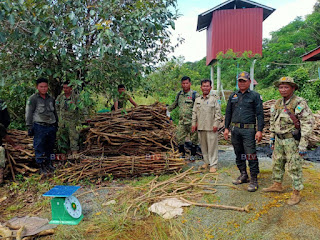Koh Kong farmer arrested for possessing ‘yellow vine’
Buth Reaksmey Kongkea
A
farmer was arrested and charged yesterday by Koh Kong provincial court for
possessing more than 7,000 kilograms of ‘yellow vine’ (teramnus libialis), a
plant used in traditional medicine but can be processed into an illegal drug.
Koh
Kong provincial environment department deputy chief Keo Sophal told Khmer Times
yesterday that the accused was identified as Nang Pov, female, 43, from the
province’s Botum Sakor district, Andoung commune.
Sophal
said that the accused was arrested and charged with growing, transporting and
selling more than 7,000 kilograms of the plant and faces up to two years in
prison if convicted.
He
noted that Pov was arrested on Friday at her house in Andoung commune’s Chi
Meas village.
He
said that she was arrested after provincial environmental officers led by the
court’s deputy prosecutor Vai Phirum raided her house at about 10:30 am on
Friday.
“She
had grown the plants, which is a rare and prohibited species, without
permission,” he told Khmer Times yesterday.
“She
wanted to sell the plants to owners of handicraft establishments that process
the vines for raw materials or traditional medicines,” he said.
He
emphasised that authorities seized more than 7,000 kilograms of the plant from
her house.
He
said the plants seized have been temporarily moved to the provincial
environment department in accordance with the order of the provincial court’s
deputy prosecutor for further investigation.
He
went on to say that according to the accused’s confession, she claimed that she
didn’t grow or collect the vines by herself.
“She
said that she bought the plants from other villagers for 200 riel ($0.1) per
kilogram. And she is re-selling them for 600 riel per kilogram,” he said.
He
added that last year, authorities also arrested a man and seized more than
8,000 kilograms of yellow vines in Koh Kong province.
Anti-drug
department police officer Colonel Chuon Sothy told Khmer Times yesterday that
the plant can be used as a traditional medicine, but it can also be processed
into a drug. He added that this plant is prohibited by Cambodian law for
propagation, transportation or any other kind of business.
(END)


Comments